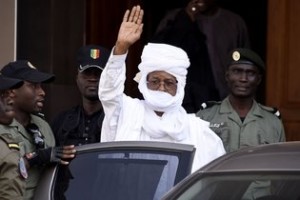by Thierry Cruvellier*
DAKAR, Senegal — Surrounded by 10 muscular prison guards, Hissène Habré, his frail body entirely swathed in white, looked smothered in his chair. He was sitting in the front row of the immense courtroom, fingering Muslim prayer beads. His boubou covered all but his eyes, and they were partly hidden by his glasses.
Mr. Habré, the 72-year-old former president of Chad, is accused of crimes against humanity, war crimes and torture regarding the deaths of an alleged 40,000 people during his rule between 1982 and 1990. July 20 was the first day of his trial before the Extraordinary African Chambers, a special court he has repeatedly denounced as “illegitimate and illegal.” And almost as soon as it started, it stopped: Mr. Habré, and his lawyers, refused to participate, and on the next day the proceedings were suspended.
The Habré trial is the event of the year in the field of international criminal law. With tensions growing between the African Union and the International Criminal Court — which African states accuse of being biased against them because it prosecutes mostly crimes committed in Africa — the E.A.C. was being touted, at least by Senegal’s justice minister, as the advent of an “Africa that judges Africa.”

Hissène Habré after a court hearing in Dakar in June. Credit Seyllou/Agence France-Presse — Getty Images
But on the first day of what may be the court’s only trial, Mr. Habré derided the E.A.C., or C.A.E. in French, as the “Comité administratif extraordinaire,” the Extraordinary Administrative Committee. He called the judges — two from Senegal, one from Burkina Faso — “simple functionaries tasked with carrying out a political mission.” As the hearing was about to begin, Mr. Habré stood up and shouted, “Down with imperialism! Down with traitors! Allahu Akbar!” A dozen of his partisans rose from their seats nearby and chanted: “Long live Chad!” “Long live Habré!” “Mr. President, we are with you!”
The Habré case suffers from the same types of deficiencies that have plagued other international criminal trials. Idriss Déby, the president of Chad since 1990, whose government covers more than one-third of the E.A.C.’s budget, was Mr. Habré’s army commander in chief. But he will not be judged in Dakar. Neither will France nor the United States, even though both countries — which are also funding this trial — supported Mr. Habré during his rule. And so naturally, Mr. Habré’s defense strategy rests on denouncing the court for being biased and partial, and calling it a front for Western governments and nongovernmental organizations.
Other defendants in recent major trials for mass crimes have also been defiant. At the International Criminal Tribunal for the Former Yugoslavia, both Slobodan Milosevic and Vojislav Seselj dismissed their lawyers and claimed the right to defend themselves. Jean-Bosco Barayagwiza called his trial before the International Criminal Tribunal for Rwanda “a masquerade,” boycotted it and refused to meet his court-appointed lawyers. (After being sentenced to a long prison term for genocide, he did pick a new counsel for the appeal.) But even that Mr. Habré will not do. In the view of François Serres, one of Mr. Habré’s lawyers, responding to the charges in the indictment, even with outrage, or simply appearing in court would lend too much credibility to the proceedings.
The second day of the trial, last Tuesday, Mr. Habré was again hauled into the courtroom by force. This time he was immured in silence. The court appointed three new lawyers to defend him, and scheduled the next hearing for Sept. 7. This was in order to “defend the interests of justice,” both the chief prosecutor and one of the lawyers explained. But when court officials and lawyers invoke the interests of justice, it’s usually when they have run out of other arguments.
William Bourdon, a lawyer for the victims — who, under Senegal’s civil law system, may be parties to the trial — dismissed Mr. Habré’s defense as a strategy “of cowardice and desertion.” Jacqueline Moudeina, a Chadian lawyer for the victims who fought for more than 20 years to bring this case to court, said it was “preferable” that the court appoint lawyers to represent Mr. Habré, even though they might just be like “decoration.” But Reed Brody, counsel and spokesperson of Human Rights Watch, had said before the trial that such an assignment would be “something of a catastrophe.”
Mr. Habré’s refusal strategy stings because it turns the sacrosanct principles upheld by human rights defenders against them. Mr. Habré’s trial is inevitable, and its outcome seems preordained, yet it must appear to be exemplary. To proceed with it without Mr. Habré and his lawyers, as they demand, would perhaps be the best way to rob their strategy of its disruptive power. But it is a move the court cannot allow itself to make: Rules of criminal procedure require the presence of a lawyer for the accused.
In the courtroom on the second day, Clément Abaitoufa, one of the better-known victims of torture under Mr. Habré’s regime, was gloomy and stone-faced: “This is going to be difficult to manage, but we had to expect it.” Leaning on his cane, Souleymane Guengueng, another famous survivor, abandoned neither his customary serenity nor his bright smile. “We must be patient,” he said. “The court must assert its authority.”
When Mr. Habré was brought out of the courtroom, his supporters gathered around him and applauded. Without a word, he raised his skinny arms in the air and clenched his fists, and before disappearing behind a wall of hulking guards from the prison security unit, made the two-fingered V sign for victory.
*Thierry Cruvellier is the author of “The Master of Confessions: The Making of a Khmer Rouge Torturer” and “Court of Remorse: Inside the International Criminal Tribunal for Rwanda.” This essay was translated by John Cullen from the French.
This article was originally published here.
